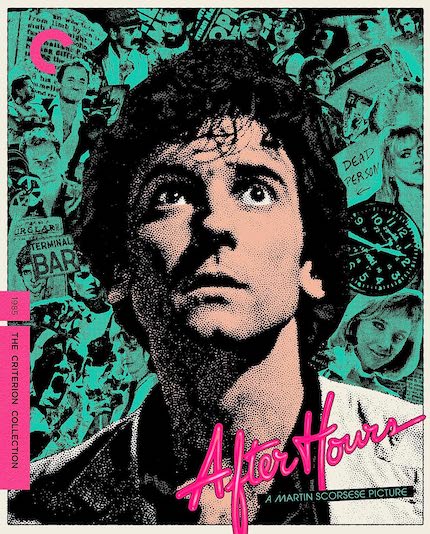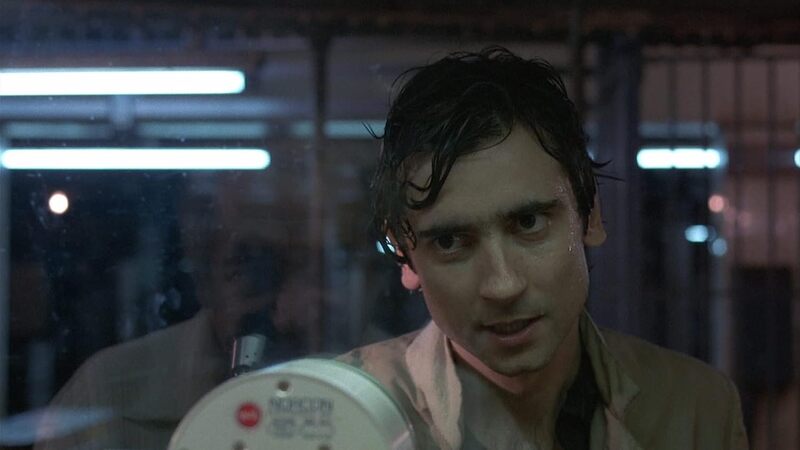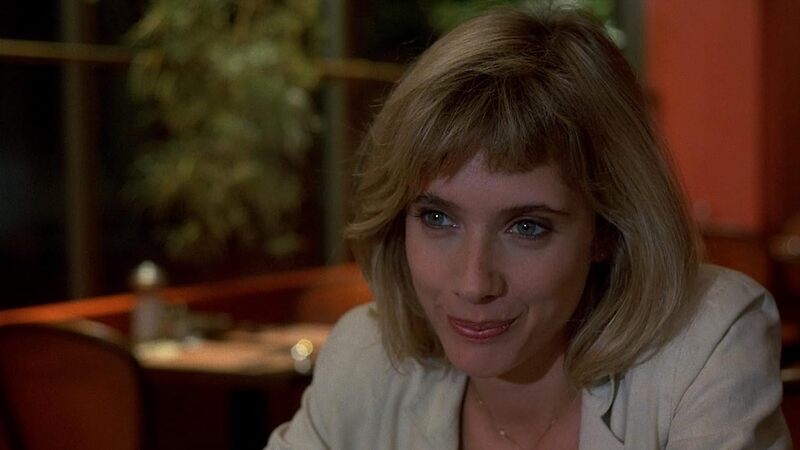AFTER HOURS 4K Review: Clocking in with Criterion
Martin Scorsese’s late night fever dream, starring Griffin Dunne, Rosanna Arquette, Catherine O’Hara, and Teri Garr, is inspired dark comedy.

So you had a bad day? An even worse night?
Paul Hackett can definitely relate. He’s just a single straight white New York City guy who lives alone when he’s not working his day job as a word processor in a bland building of word processors seated at word processors.
But when a promising evening diner meet-cute lures him to the dark otherworldly realm of the SoHo loft district late at night, he finds himself stuck there. Completely, thoroughly, inescapably stuck there. Trapped.
His night only grows incrementally worse from there. It’s as though Paul (Griffin Dunne), in his self-serving initial venture to hook up with Marcy (Rosanna Arquette), crosses over into some kind of Sartreian netherworld where Hell really is other people.
Those other people include Marcy’s roommate, who’s an intimidating and frighteningly sexy sculptor (Linda Fiorentino); Marcy’s boyfriend (John Heard), who’s a bartender stuck tending the bar but worried about his apartment; a quirky waitress (Teri Garr) with access to making infinite Xerox copies who decides that Paul is some sort of thief who must be stopped; an ice cream truck driver who might just be a demonic chaos agent (Catherine O’Hara); and a lonely-hearted barfly (Verna Bloom), whosr method of helping him is to literally encase him.
Along the way, Paul deduces that the beautiful Marcy has been horrifically burned. He is made to do some Papier-mâché grunt work on an Edvard Munch-like sculpture that is taken by Cheech and Chong. He’s accused of murder, and he witness at least one. He’s accused of theft when all he says he wanted was a bagel and cream cheese-shaped paperweight. He can’t take the subway because he’s lost all his money. (An NYC rookie error if you ask me, but then again, I’ve never been there, so what do I know?) An angry mob takes after him. If it all sounds like one big nocturnal anxiety dream, you’re not wrong.
In this eerily empty urban area, time seems to mean nothing. (It really is “after hours”). For Paul, who on an ordinary night would’ve probably been to bed long before he ever even departed in the first place, this is tantamount to the hourglass shattering and all the sand and glass getting everywhere. South of Houston Street, north of Hell. Or is he?
As the night spirals on, Paul’s entrapment becomes more and more of a squeeze of Dante’s Bad Place’s concentric circles closing in on him. Fire and rain. Partitions and fences. Cheech and Chong. Speed and entrapment. Keys and locks. Distance and direction. Resistance and dissection. Blood and plaster. Piss and vinegar. Knowledge and innocence. Words and processing…… Different rules apply after hours.
Martin Scorsese directs all of this mid-‘80s mix-up milieu with quick-cut twists of the proverbial knife. His quirky casting is what you’d expect from a Paul Thomas Anderson movie. And also the oblique, impenetrable internal logic.
Comedians and colorful real-life personalities fill the weird roles with unhinged verve and vitriol, even before the ill-fated 125 mile-per-hour cab ride to SoHo (the director knows a thing or two about whackadoodle taxi drivers), Scorsese portrays a bleak outlook on soulful endeavors. In every diner, bedroom, and corporate workplace, hopeful personal plans are forsaken by necessity, all in the unfortunate interest of hand-to-mouth survival. Must all of life be like the massage Fiorentino requests? “Make it hurt and you’re on the right track.”
Paul’s predilection for blondes is shared by the movie itself, which maintains its own revolving door of them. Arquette, Garr, O’Hara, Bloom… each is dangled as a potential booty call (and each firing on all cylinders) that Paul -- the sexual vulture that Dunne subtly plays him as -- set out for in the first place. And all (but one… the oldest one) turn on a dime into frightening, overwhelming hysteria.
Paul, though, can also hold his own when it comes to mentally snapping. He’s not a particularly likeable everyman, but that is, in fact, part of the point. Even if Paul can ever get his butt out of the sexualized Wizard of Oz weirdness of SoHo and back home to his “better world,” there is no exit from himself.
Scorsese, once thought of as a pull-no-punches movie deity of college dorm room worship, is now an old man best known by the younger set for denouncing Marvel movies. (Oh, the gatekeeping!) But as that younger set rapidly loses its acquired taste for said Marvel movies, what will they be left with in camera? Are we looking at an entire generation of Paul Hackett dead end kids behind closed doors, fit to be tied in a vicious circle with no way out? Perhaps After Hours will speak to them then.
In the meantime, Amy Robinson testifies on the commentary, a multi-participant track repurposed from the film’s 2003 DVD release with 2023 comments by her and Dunne added, that “Marty is absolutely not a snob about movies.” So there.
While the individual entries on the set’s “supplements” section may appear fairly brief, the content is truly substantial. In a new in-person conversation between Scorsese and writer Fran Lebowitz, the filmmaker takes the opportunity to look back on the tremendously cloistering period of his own career that not only led him to After Hours but defined the project as the absolute right film at the right time for him. (As opposed to Tim Burton, who was gonna make it, but didn’t).
A production as down and gritty as its final result, After Hours would signal a creative bouncing back of sorts for Scorsese if not a full-on return to form. Prior to it, his epic production of The Last Temptation of Christ was abruptly cancelled before shooting after a year of prep. (He would later make the film for a 1988 release, enabled by the mainstream success of After Hours’ follow up, The Color of Money). His previous film, 1982’s The King of Comedy, was a widely heckled flop.
For all its imbroglio and embranglement, After Hours plays at a destabilizing speed, a fast-moving brouhaha. It’s what it needed to be. Truth be told, the contextualizing of After Hours within the dismal early ‘80s career of Scorsese is even more engaging than After Hours itself. The movie’s saving grace is that it never stops moving in its relatively brief hour and thirty-seven minutes.
The film’s baked-in paranoia and isolation are visually enabled by the SoHo location shoot itself, inspired to move quickly and make the most of what’s already there. Much of this was successfully enabled by cinematographer Michael Ballhaus, who cut his teeth shooting 16 Fassbinder films in eight years. Criterion, having released quite a few Fassbinder films over the decades, is well experienced in handling Ballhaus’ work for digital home video. (See: 1978’s The Marriage of Maria Braun. Seriously. See it).
Consequently, After Hours, joining the hallowed Collection both on 4K UHD disc and on Blu-ray, looks authentically filmic. The 4K UHD edition comes with a 4K UHD disc containing only the film (and the optional commentary track) presented in Dolby Vision HDR and also the Blu-ray disc, containing the film and all the special features. Either way, the image is sourced from a new 4K digital restoration, approved by editor Thelma Schoonmaker, with an uncompressed monaural soundtrack.
In the highly entertaining chat between Scorsese and Lebowitz (obviously old friends), he describes being awash in feelings of rejection, isolation, and loss of purpose. In that moment, being in a creative place meant danger. As a filmmaker, was he dead? If so, his dread was such that he felt an inability to pay the boatman into the afterlife.
When he read Joseph Minion’s After Hours screenplay, which had been optioned by actor/producers Amy Robinson and Griffin Dunne, he couldn’t help but relate to the plight of a broke man trapped in an artist’s district that’s out to get him. The irony, then, is that in forging After Hours as his own, Scorsese was in fact released from his dark abyss, reset for what would be a true onward-and-upward career trajectory. His own better world. Within a decade, he would commonly be referred to as America’s greatest living film director.
Other supplemental features include a 2003 short documentary, Filming for Your Life: The Making of After Hours, featuring Dunne, Robinson, Schoonmaker, and Scorsese. Costume designer Rita Ryack and production designer Jeffrey Townsend participate in a very informative and interesting new featurette on the look of the film.
Also included are some deleted scenes, the film’s trailer, and a printed essay by critic Sheila O’Malley. It’s all contained in the quite cool new artwork by Drusilla Adeline/Sister Hyde. The release comes highly recommended, particularly the 4K edition.
These decades later, even as SoHo is now a different world and Scorsese long ago made his way back to work, After Hours remains a peculiar whirlwind that will not just keep you guessing, it’ll keep you answering incorrectly. Being a dark comedy, it’s a long and rambling joke that doesn’t care about its punchline.
The strange knowing winks of Rosanna Arquette and Dick Miller linger, for Paul and for us, as undecodable. What do they mean? What do they signal? What are we not getting?? “Now what?!??” What can anyone say? It’s After Hours. Different rules apply.
Note: this review was written during the 2023 WGA and SAG-AFTRA strikes. Without the labor of the writers and actors currently on strike, the movie being covered here wouldn't exist.
The film is now available from The Criterion Collection.
After Hours
Director(s)
- Martin Scorsese
Writer(s)
- Joseph Minion
Cast
- Griffin Dunne
- Rosanna Arquette
- Verna Bloom









